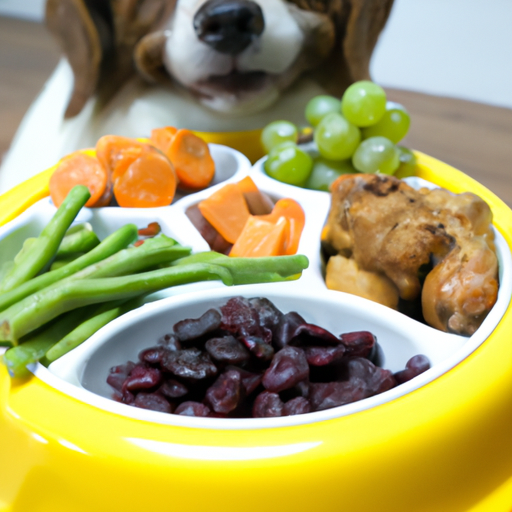As a dog owner, you’ve probably found yourself wondering what human foods are safe for your furry friend to consume. After all, those puppy dog eyes can be hard to resist when they’re begging for a bite of your dinner. But not all human foods are safe for dogs.
In this comprehensive guide, we’ll delve into eight categories of human foods that are not only safe, but also beneficial for dogs.
1. Protein Sources
First and foremost, dogs need a good source of protein. Some human foods that are excellent sources of protein for dogs include:
- Chicken
- Turkey
- Fish (such as salmon)
- Eggs
These foods should be cooked and served without any seasonings, especially onion and garlic, which can be harmful to dogs.
2. Fruits and Vegetables
Fruits and vegetables are a great source of vitamins and minerals for dogs. They can be served raw, cooked, or pureed. Some suitable choices include:
- Apples (without the seeds)
- Bananas
- Blueberries
- Carrots
- Green Beans
- Spinach
However, remember to avoid grapes and raisins, as they can cause kidney failure in dogs.
3. Dairy Products
While some dogs are lactose intolerant, others can handle small amounts of dairy products. These can include:
- Cheese (in small amounts)
- Plain yogurt
Ensure that any dairy products you give your dog are low in fat and sugar.
4. Whole Grains
Whole grains can be a great source of fiber for dogs. Some safe options include:
- Brown rice
- Oatmeal
- Quinoa
These should be cooked and served plain, without any seasonings or butter.
5. Legumes
Legumes, such as beans and lentils, are packed with protein and fiber. They can be a great addition to your dog’s diet. However, they should be cooked and served plain, with no added salt or seasonings.
6. Seeds and Nuts
Some seeds and nuts can be beneficial for dogs. These include:
- Flaxseeds
- Chia seeds
- Pumpkin seeds
- Peanut butter (unsalted and without xylitol)
However, avoid giving your dog almonds, pecans, and macadamia nuts, as they can be harmful.
7. Oils
Certain oils can be beneficial for dogs. For example, fish oil can help improve a dog’s coat, while coconut oil can aid digestion. However, these oils should be used sparingly, as they are high in calories.
8. Miscellaneous Foods
Other human foods that are safe for dogs include:
- Pumpkin
- Sweet potatoes
- Cooked salmon
These foods are packed with essential vitamins and nutrients that can aid in digestion and boost your dog’s overall health.
FAQ Section
Can dogs eat chocolate?
No, chocolate is toxic to dogs and can cause serious health problems.
Are there any fruits or vegetables that dogs should avoid?
Yes, dogs should avoid onions, garlic, grapes, raisins, and avocados, as these can be harmful.
How much human food can I give my dog?
It’s best to limit human food to 10% of your dog’s daily calorie intake. The rest should come from a balanced dog food.
Can dogs eat raw meat?
While some dog owners feed their dogs a raw diet, it’s not without risk. Raw meat can contain harmful bacteria that can cause food poisoning.
Can dogs eat nuts and seeds?
Some nuts and seeds, like flaxseeds, chia seeds, and peanut butter, are safe for dogs. However, avoid almonds, pecans, and macadamia nuts.
Remember, every dog is unique, and what works for one might not work for another. Always introduce new foods slowly and watch for any signs of digestive upset or allergic reactions. If in doubt, consult with your vet.



